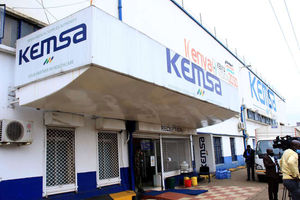Kenya staring at sanctions as Health officials bungle tender

Kenya Medical Supplies Authority (Kemsa) Embakasi warehouse, Nairobi on December 1, 2020. Rogue Ministry of Health officials may have embezzled at least $1.353 million (Sh185 million) in a donor-funded campaign that has left the government staring at refunds and potential sanctions from the Geneva-based Global Fund.
Rogue Ministry of Health officials may have embezzled at least $1.353 million (Sh185 million) in a donor-funded campaign that has left the government staring at refunds and potential sanctions from the Geneva-based Global Fund.
Correspondence between the Global Fund and senior Health Ministry officials seen by the Nation indicates that the donor has demanded a refund if no justification is made for flagged spending that ranges from double payment of suppliers and allowances to unsupported purchases during a 2020-2021 malaria awareness campaign.
The civic education drive intended to increase malaria prevention knowledge in areas where the disease is rampant, but may have turned into a gravy train for some health ministry officials as flagged in audits by the National Treasury and the Global Fund.
Kenya now risks being blacklisted by the Global Fund, which is set to review several “prohibited practices” that saw at least Sh75 million disappear without a trace. The donor has already threatened to cut its funding for the malaria programme in the 2023-2024 period.
In April, the organisation gave the Ministry of Health 60 days to give evidenced explanations on how a flagged Sh72.8 million portion of the donor funds were spent or refund the amount. The Global Fund is investigating a further Sh75.8 million spent, which it says involves “prohibited practices”. No details have been given on what the practices entailed.
An unspecified amount of the money was paid out through the mobile money platform M-Pesa, and described as salaries in a bid to cover up the embezzlement, the Global Fund’s review shows.
At the time of the alleged misappropriation, the amount was Sh148.6 million. But upward dollar fluctuation will force taxpayers to dig deeper to pay for the sins of rogue Ministry officials if no justification is made for the flagged spending.
Communication between the Global Fund and two Principal Secretaries – Dr Josephine Mburu and Eng Peter Tum – indicates that the current incident is not the Ministry of Health’s first tango with misappropriation of the donor’s money.
Some of the officials previously implicated in embezzlement and other funds misappropriation incidents are senior managers.
“There are staff who have been engaged in the prohibited practices in the past who continue to be engaged in the Global Fund grants. The same individuals are allegedly implicated in more fraudulent activities. These staff should be disengaged from the management of the Global Fund grants with immediate effect,” demanded the Fund.
“The review findings add to our growing concern, previously shared, on unstable leadership and weak financial management and oversight in the malaria programme. We currently question the ability of the programme to successfully deliver and manage compliance on the 2023-2024 LLIN campaign in which the Global Fund is a main investor. We trust decisive action will be taken quickly to remedy the situation,” the Global Fund added.
Disciplinary action
The Fund is also concerned that the letter written to the Ministry of Health demanding that disciplinary action be taken against the staff engaged in prohibited practices under the malaria grant remains unanswered.
In February, the Global Fund asked the Health Ministry to replace the Malaria Programme’s finance officer. There was no action taken at the time it wrote to Dr Mburu and Eng Tum in April.
The Fund has now demanded that the Health Ministry replaces the finance officer by June 30, 2023. The Global Fund insists that it reviews the recruitment process to ensure that a qualified and ethical candidate takes over.
The Global Fund audit review observed that there were overpayments to security officers that were working on the project in Homa Bay County. Based on the attendance schedules, the security officers were to be paid Sh500 for the 240 days that they worked on the project. This was amounting to Sh120, 000.
However, the project paid 136,500 per security officer totalling Sh8, 332,500 as opposed to Sh7, 440,000. The Ministry paid Sh892, 500 (US$ 8,118.21) more to the officers.
“There were also identified instances where the allowances paid for various activities were more compared to the support documentation,” said the statement to the Ministry of Health.
In Turkana County, the audit identified an overpayment of Sh444, 800 which was mostly payment made to officers who did not sign the attendance schedules, with many of the receipts not being supported.
In Kisumu County, on July 20, 2021, there was a payment of Sh137, 400 made. Only Sh5,250 was signed for. The balance of Sh132,150 was not supported. This applied to another Sh64, 000 which was given with no support documents. In total, Kisumu overpaid Sh196, 550.
Uasin Gishu County overpaid Sh123, 000, Mombasa Sh112, 500, and Nandi 132, 500 (The number of days paid for offering security services do not agree with those in the signed attendance schedules) with Migori County and Kwale overpaying Sh37,000 and Sh60,000 respectively. In Kwale, the attendance signed schedules for five days for the security offered, but they were all paid for 10 days instead.
In Vihiga County, the audit observed that a Malaria Coordinator worked in seven different wards, charging five days at each ward as a distribution supervisor. However, the distribution at the different wards spanned only nine days between June 21 to 29, 2021. The coordinator was paid Sh124, 820. “The amount is questionable,” says the audit.
In Marsabit, the audit observed Sh672, 000 (USD 6,113) cash payment was made for fuel, and this was never supported with an invoice, receipts or work tickets. The supporting documents provided were copies of proforma invoices.
On April 6, 2021, Marsabit County fueled the project vehicles in three different stations including Burqa Fuel Station Ltd where they made a cash payment of Sh207, 000. In Heller Petroleum another Sh536,000 was paid on the same day. At Sagal petrol station, fuel worth Sh277,500 was made in cash. All are not supported.
On May 15, 2021, at Bari Energy Ltd, the fuel amounting to Sh465,000 was paid in cash. At Sagal Petrol Station Ltd another Sh484,300 and at Heller Petroleum Sh849,000 fuel paid in cash. And in about one month, Marsabit County spent Sh2.9 million on fuel and this was never supported by an invoice. Erroneously, Kilifi County paid Sh21.6 million to Safaricom on June 7, 2021. The Global Fund noticed the discrepancies and wrote to Safaricom (service provider) to reverse the payment, only Sh15.1 million was recovered leaving a balance of Sh6.5 million.





